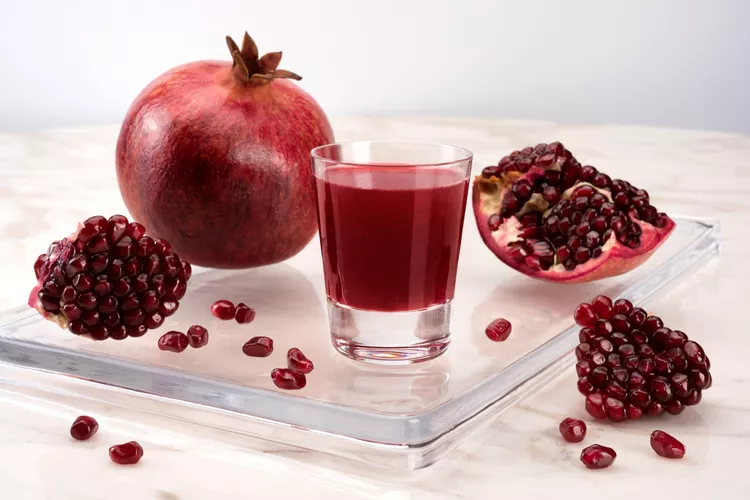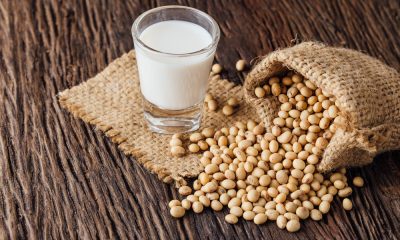Health
Benefits of cranberry and side effects

Discover The Health Benefits of cranberry and side effects.
Native to North America, you may know cranberry best by its English name: cranberry. This little red berry with a lingonberry-like appearance and very tangy taste is grown almost exclusively in the United States and Canada, where it is very popular.
It’s a safe bet that its popularity is mainly linked to its many health benefits. Indeed, behind its small size, the cranberry hides a very interesting composition.
First of all, it has an exceptionally high content of antioxidants. It is also one of the richest fruits in antioxidants! It is also very rich in vitamin C and fibre, 100g serving to provide 22% and 18% of the recommended intake respectively.
Besides this, cranberries contain vitamin B, E and K, as well as a large number of minerals, such as calcium, manganese, iron, copper and potassium. Finally, it is also very rich in water and very low in calories.
As you can imagine, all of this gives it some benefits. We take them again in this article and we explain how to consume it.
What are the health benefits of cranberry?
Although cranberries have been the subject of numerous scientific studies to demonstrate their benefits, people in North America have not waited for their results to benefit from them. Indeed, cranberries have been used for centuries for medicinal reasons.
Below are the health benefits of cranberry.
1) It helps prevent urinary tract infections
This is surely the most famous benefit of cranberries. The Iroquois Indians already used it for this purpose centuries ago and if you have ever had a urinary tract infection, no doubt that you have been praised for its merits in the matter!
Indeed, cranberries are very effective in helping to prevent the onset of urinary tract infections. It is therefore generally recommended for people who are most at risk of suffering from an infection, such as cystitis, or who have repeated infections.
Its preventive action, proven by several scientific studies, is due to proanthocyanidins, antioxidants present in cranberries. These have non-stick properties that prevent bacteria, such as E.Coli, from settling on the cells in the walls of the bladder. Bacteria cannot, therefore, settle and multiply there, and they are then eliminated without hindrance as soon as we go to the toilet.
However, cranberries only have a preventative effect. Although many people claim that it can also treat the infection once it sets in, no studies have been able to show this. At most, it relieves the infection in some people. In this case, it is therefore recommended to go see a doctor for appropriate treatment.
Finally, note that to take advantage of its preventive effects, it is important to consume cranberries regularly. Some doctors recommend drinking one to two glasses of cranberry juice a day.
2) It improves cardiovascular health
Consuming cranberries regularly will also be good for your heart.
Indeed, this little fruit has very beneficial effects on cholesterol, firstly because it stops the oxidation of bad cholesterol, but also because it allows increasing the levels of good cholesterol in the blood. This is due to the flavonoids contained in the cranberry.
Flavonoids also help lower the risk of developing atherosclerosis, a disease that causes arteries to narrow due to high levels of cholesterol and fat in the blood.
Also, cranberry participates in cleansing and purifying the blood, eliminating the toxic components it contains, and helps to soften the arteries.
All of this helps lower blood pressure and lowers the risk of suffering from a heart attack or stroke.
3) It helps to lose weight
Thanks to the organic acids it contains, cranberries help eliminate the fat that your body has accumulated.
However, if you want to lose weight, it is important to combine it with a balanced diet so as not to provide your body with extra fat that is not necessary for its proper functioning.
Also note that, if you consume the cranberry in the form of juice, you should not choose just any juice. Indeed, some cranberry juices sold in stores are very sweet and will therefore not provide the desired effect.
If you have a juice extractor, the best solution is to create your juice. To cut the acidity of the cranberry, you can mix its juice in water or another fruit juice.
4) It helps protect the stomach
Cranberry helps against many bacteria, and those that can attack our stomach are no exception! Among these is the bacterium Helicobacter pylori.
By landing on the walls of our stomach, it can cause inflammation of the stomach and give rise to ulcers, chronic gastritis or, in the worst case, stomach cancer.
The flavonoids in cranberries help fight this by preventing the growth of these bacteria. Regular consumption of cranberries therefore helps prevent infections.
Also, when used in addition to conventional treatment, it joins forces with the treatment and improves its effectiveness, thus allowing the bacteria to be eliminated more quickly.
However, these effects were mostly observed in women. On this point, cranberries are therefore less effective in men.
5) She participates in oral hygiene
The proanthocyanidins found in cranberries prevent bacteria from growing and taking up residence in the mouth, especially on the teeth and gums.
Thus, cranberry helps reduce cavities and dental plaque, but also to fight against periodontal disease, a type of disease that affects the gums by causing inflammation of its tissues. Besides, thanks to its calcium content, it helps strengthen teeth.
However, in all cases, prefer the consumption of natural juices rather than juices sold in supermarkets. Indeed, remember that these often contain a large amount of sugar, which is far from good for your teeth.
6) It helps keep skin young
The antioxidants found in cranberries are very beneficial for the skin. On the one hand, they protect it against the action of free radicals, which can cause skin inflammation and contribute to ageing.
On the other hand, they stimulate the production of collagen, which helps to maintain the firmness of the skin and, thus, to fight against the appearance of wrinkles.
7) It fights against winter diseases
Thanks to its antibacterial properties, cranberry is also very useful in winter because of its high content of vitamin C helps strengthen our immune system.
Besides, in general, cranberries repel bacteria and thus offer us an additional barrier against infections and viruses. It is particularly effective against colds and flu, as well as sore throats in general.
8) It helps fight certain cancers
According to several studies, cranberries help fight colon, prostate, breast and lung cancer by stopping the development of tumours. This is due to the polyphenolic compounds it contains, but also to its content of flavonoids and salicylic acid.
Together, they help in particular to inhibit the growth of harmful and cancerous cells. Besides, salicylic acid fights the formation of clots in the blood, which can cause tumours.
For its part, the high fibre content of cranberries also has a role to play against colon cancer. This is because fibre stimulates the production of butyrate, a substance that maintains gut health, supplies colon cells with energy and prevents the development of tumours in the colon.
9) it fights against memory loss
The cranberry would reduce the risk of facing memory loss or suffering from Alzheimer’s disease. Indeed, its antioxidants eliminate free radicals that could attack neurons. However, its effects on Alzheimer’s disease have yet to be demonstrated.
How to consume cranberries?
cranberry dish
Cranberries come in many forms. It can, of course, be consumed in its natural form, although it is often preferred to add a little sugar to it to reduce the acidity of the berries. You can also find dried cranberries.
These have the advantage of being richer in antioxidants than fresh cranberries, but they are also higher in sugar. Whether fresh or dried, cranberries can be used in salads, sauces, compotes and pastries, for example.
Besides this, cranberries are frequently consumed in the form of juice. However, if you want to enjoy its benefits and maintain a healthy diet, it is important to make sure that you choose a juice with no added sugar, or with as little sugar as possible.
Finally, if you don’t particularly like its taste or want to undergo a cranberry treatment, you can find it in pharmacies in the form of tablets and capsules. In this case, it is important to follow the advice of your pharmacist, who can tell you the appropriate treatment and the doses not to be exceeded.
In this regard, it is important to note that, if consumed in too large quantities, cranberries can cause side effects in the gut, such as cramps and diarrhoea. Fortunately, a small daily dose is often more than enough to reap its benefits!
Finally, note that its consumption is not recommended if you take aspirins or anticoagulant drugs, as well as if you suffer from kidney stones or if you are predisposed to them.
And you, have you ever tasted cranberries? Do you like its tangy side?
We hope the article on the health benefits of cranberry has been of help to you.
Health
Benefits of pomegranate juice

Discover the benefits of pomegranate juice.
Frequent consumption of pomegranate juice can help us prevent multiple ailments and promote better blood circulation.
Drinking natural juices is good for our health. Surely you have read or heard this statement often. Among them, a very beneficial one is pomegranate juice.
Although all fruits are nutritious, each one has its properties. Here we will tell you about the benefits of pomegranate juice.
The tree that provides us with this delicious fruit is the pomegranate. It blooms between April and June and can survive up to 1,100 meters high.
It is native to Asia but today it is also planted near the Mediterranean Sea, South America, Australia, and South Africa.
Traces of the use of the pomegranate by the peoples of desert areas have been found since it was preserved for quite some time.
For example, in Greece, it is said that the first tree was planted by Aphrodite. In Java the fruit is used in pregnancy rituals and in China it is offered to newlyweds to guarantee great offspring.
1. Antioxidants
Pomegranates have been consumed throughout history for their medical benefits. Today, the juice of this fruit is a popular part of healthy diets.
Pomegranate seeds get their bright red color from polyphenols. These chemicals are powerful antioxidants.
Pomegranate juice contains higher levels of antioxidants than most other fruit juices. It also has three times more antioxidants than red wine and green tea. The antioxidants in pomegranate juice can help scavenge free radicals, protect cells from damage and reduce inflammation.
2. Vitamin C
The juice of a single pomegranate has more than 40% of your daily vitamin C requirement. Vitamin C can break down when pasteurized, so choose homemade or fresh pomegranate juice to get the most nutrients.
3. Cancer prevention
Pomegranate juice caused a sensation when researchers found that it could help stop the growth of prostate cancer cells. Despite multiple studies on the effects of juice on prostate cancer, the results are still preliminary.
Although there have been no long-term human studies proving that pomegranate juice prevents cancer or reduces risk, adding it to your diet doesn’t hurt. There have been encouraging results in the studies so far, and larger studies are now underway.
4. Protection against Alzheimer’s disease
The antioxidants in the juice and their high concentration are believed to stop the progression of Alzheimer’s disease and protect memory.
5. Digestion
Pomegranate juice can reduce inflammation in the intestines and improve digestion. It may be of benefit to people with Crohn’s disease, ulcerative colitis, and other inflammatory bowel diseases.
Although there are conflicting beliefs and research about whether pomegranate juice helps or worsens diarrhea, most doctors recommend avoiding it until you feel better and your symptoms have resolved.
6. Anti-inflammatory
Pomegranate juice is a powerful anti-inflammatory due to its high concentration of antioxidants. It can help reduce inflammation throughout the body and prevent oxidative stress and damage.
7. Arthritis
The flavonols in pomegranate juice may help block inflammation that contributes to osteoarthritis and cartilage damage. Possible effects on osteoporosis, rheumatoid arthritis, and other types of arthritis and joint inflammation are currently being studied.
8. Heart disease
Pomegranate juice might be the most heart-healthy juice. It protects the heart and arteries.
Small studies have shown that the juice improves blood flow and prevents arteries from becoming stiff and thin. It can also reduce the growth of plaque and cholesterol buildup in the arteries. However, pomegranate may react negatively with blood pressure and cholesterol medications such as statins.
Be sure to talk to your doctor before indulging in juice or taking a pomegranate extract supplement.
9. Blood pressure
Drinking pomegranate juice daily can also help lower systolic blood pressure. A comprehensive review of randomized controlled trials indicated that including pomegranate juice every day would be beneficial for heart health.
10. Antiviral
Between vitamin C and other nutrients that boost your immune system like vitamin E, pomegranate juice can ward off illness and fight infections. Pomegranates have also been shown to be antibacterial and antiviral in laboratory tests. Its effects on common infections and viruses are being studied.
11. Rich in vitamins
In addition to vitamin C and vitamin E, pomegranate juice is a good source of folate, potassium, and vitamin K.
Whether you decide to add pomegranate to your daily diet or just drink it occasionally, check the label to make sure it’s 100% pure pomegranate juice with no added sugar. Or, prepare it fresh.
12. Memory
According to a recent study, drinking 8 ounces of pomegranate juice daily can improve learning and memory.
13. Sexual performance and fertility
The concentration of antioxidants and the ability to affect oxidative stress make pomegranate juice a potential fertility aid. Oxidative stress has been shown to cause sperm dysfunction and decrease fertility in women.
The juice has also been shown to help reduce oxidative stress in the placenta. However, researchers do not yet know the exact benefits it may cause. Drinking pomegranate juice can also increase testosterone levels in men and women, one of the main hormones behind the sex drive.
14. Endurance and sports performance
Set aside the cherry pie and beetroot juice. Pomegranate juice may be the new sports performance booster. The juice can help reduce pain and improve stamina recovery. It also decreases oxidative damage caused by exercise.
15. Diabetes
Pomegranate was traditionally used as a remedy for diabetes in the Middle East and India. Although much is still unknown about the effects of pomegranate on diabetes, it may help lower insulin resistance and lower blood sugar.
Conclusion
Green juice isn’t the only healthy option out there. Adding pomegranate juice to your diet can reduce your risk of chronic disease and inflammation. It’s also a wonderful way to get the nutrients from the fruit and boost antioxidants.
There are several brands of pomegranate juice for purchase online. It is a good idea to compare the different products to choose the one with the greatest benefit.
It’s best to check with your doctor before drinking pomegranate juice every day to make sure it won’t interfere with any of your medications. Also, diabetics should check their blood sugar daily if they choose pomegranate juice over the whole pomegranate to ensure blood sugar remains at its optimal level.
Health
60 tips for healthy weight

Discover the 60 tips for healthy weight loss.
Excess weight can be considered not as an essentially aesthetic problem, but as a personal health problem.
In addition to the damage caused by excess body fat, the overweight individual is also frequently exposed to other health problems, since overweight and obesity are associated with an unhealthy diet and lifestyle sedentary.
As if that were not enough, some people, influenced by unrealistic beauty standards, end up looking for shortcuts to lose weight, resorting to fad diets, which are often harmful to health, or the use of chemical substances, often without the help of an experienced professional.
The point of this article is not to present miracle weight loss formulas or to teach secret tips that will make you lose weight quickly and effortlessly. That does not exist.
The objective of this text is to show that the implementation of small changes in eating habits and lifestyle can have a great impact in the medium and long term on the control of ideal body weight.
60 tricks to maintain a healthy weight
The weight loss process can be summed up as the simple difference between the number of calories you consume per day minus the number of calories your metabolism burns daily.
That is, if you eat more calories than you burn over several days, you will gain weight.
On the other hand, if your daily calorie intake is less than the number of calories your body burns, you will lose weight.
If the intake and burning of calories are the same, your weight will remain stable over the weeks.
Therefore, we can share our tips in 2 groups:
• Tips for consuming fewer calories throughout the day.
• Tips to increase your calorie burn throughout the day.
Tips to consume fewer calories
1- Avoid the consumption of sodas with sugar. A single can of Coca-Cola has 35 grams of sugar, which offers 139 kcal.
Just as a comparison, 35 grams of sugar is 8 to 10 tablespoons of sugar. Already 139 kcal is the average expenditure of a 40-minute walk.
If you consume more than one can of Coca-Cola a day, simply stopping this consumption will make you lose a good amount of kilos in a few weeks.
Diet sodas may not be a healthy drink, but they are much better than non-diet sodas in terms of sugar and calorie intake.
2- It is not only soft drinks that contain excess sugar. Before buying a drink, look at the amount of sugar and calories in it.
Energy drinks and products for hydration during physical activity, such as Gatorade and Powerade, also have excess sugar.
A bottle of Gatorade, for example, has 30 grams of sugar or about 8 teaspoons of sugar.
3- Do not be fooled by industrial products that are called natural. Many brands of boxed or bottled juices, which claim to be made with 100% fruit, actually add sugar to enhance the flavor.
Just because orange juice is made with real orange does not mean that the manufacturer did not add sugar to its formula.
See the nutritional references on the back. If sugar has been added, avoid, because the fruit itself is a food rich in carbohydrates.
4- At mealtimes, do not fill the plate. Put less food than you think is necessary. At the time of hunger, our ability to estimate the necessary amount of food is compromised, and, many times, we eat more than we need just to avoid leaving the leftovers on the plate.
5- Following the same logic as the previous topic, use smaller plates. A small full plate can pass the feeling that there is the ideal amount of food better than a large empty plate.
6– Do not feel obliged to always finish the plate. If you are satisfied, stop eating even if there is food on the plate.
7- Eat only in one place in the house, for example, in the living room or the kitchen. This can break the habit of eating in certain places in the house outside of mealtimes, such as at the office, in bed, in front of the TV, etc.
8- Create a reward system at the end of the day or week after following a diet with fewer calories.
Rewards can be anything that makes you feel good: go to the mall, get a haircut, manicure, rent a movie, get massages, have sex, etc.
Family collaboration is very important in this system. The reward should not be for weight loss, but better habits. Note: Never use food as a reward.
9- Find out which feelings or activities most frequently activate the trigger of the desire to eat. Try to have control over these situations. If possible it is good to eliminate them.
10- See which are the hypercaloric foods that you consume the most. Stop buying them. If you have it at home, it is almost impossible not to consume. The best way not to eat something with too many calories is not to have easy access to it.
11- Create a journal or blog about your diet. Write daily about successes and failures. Seeks to learn from the mistakes of the previous days.
12- After each bite, take a sip of water. This will make the stomach fill more quickly, reducing the amount of food needed to meet your needs. When the stomach is full, the body releases neurotransmitters responsible for feeling full.
13- Eat slowly, chew your food well and take breaks during your meal. It allows time for the body’s satiety mechanisms to kick in.
14- Vegetables and legumes are not only healthy, as they have few calories. If you eat a good salad during your meal, you will be taking up space in your stomach with food that provides few calories.
Eat the salad before preparing the main dish or reserve at least 50% of the main dish space for vegetables and legumes.
15- It is useless to eat salad if you are going to fill it with sauces, especially those based on mayonnaise and cheese, which are calories.
16- Make a longer interval between food and dessert. See if you really need it or if the candy is simply a habit or a form of reward
17- Brush your teeth as soon as you finish eating; that will make you think twice about choosing dessert.
18- Fight boredom with activities, not with food. Try drinking a glass of water before pinching a treat to see if the urge to eat passes.
19- Olive oil is a healthy type of fat, but it has a lot of calories. If the goal is to lose weight, filling your food with oil is not going to help. Use it in moderation.
20- Avoid frying foods that can be cooked. This drastically reduces the number of calories in food.
21- Avoid breaded foods, parmesan, gratin, sauces rich in mayonnaise, four-cheese sauces, fried foods, or other foods rich in fat, since they tend to be hypercaloric.
22- Roast chicken is a good option, but it should be eaten without the skin.
23- Fish is the best meat option.
24- Eliminate fast foods from your diet. They are nutritionally poor and calorie-dense foods.
25- Sleep at least 7 to 8 hours a day. Our body expends more calories when we are sleeping in deep sleep than when we are just lying down, reading, or watching TV. Those who sleep little have a greater risk of gaining weight.
26- Ask a nutritionist for help to prepare a diet with the ideal amount of calories for you.
27- When shopping, if there is more than one similar product on the supermarket shelf, check the nutritional information for the option with the least calories.
28- Never buy a product without first consulting the nutritional information, especially the number of calories in the food.
Over time, you will learn to identify the best foods for losing weight or keeping it healthy.
29- Understand that food re-education is far superior to any diet. It may take longer to reach your desired weight, but you will surely have an easier time maintaining your desired weight in the long term.
30- When buying dairy products, always try the skim, light, or lean versions. This works for yogurts, milk, cheeses, etc.
31- If you want to eat ice cream, the popsicle is a better option than box ice cream.
32- Whole foods are healthier, have more fiber and fewer calories. The fibers help induce a feeling of fullness.
33- Alcoholic beverages are hypercaloric. The higher the alcohol content, the more calories the drink contains.
34- Avoid buying prepared meals in supermarkets. In addition to being hypercaloric, they tend to have a large amount of salt.
35- You do not have to eliminate any type of food. If you can’t live without pizza on the weekend, calculate how many calories you can consume throughout the day.
You can have a pizza for dinner on Saturday, as long as you have lighter meals throughout the day.
It is important to avoid flavors that are high in fat and calories, such as four kinds of cheese or bacon.
Remember that each slice of pizza can contain between 200 and 300 kcal. The less greasy the pizza is, the more slices you can consume.
36- Losing weight is much easier than maintaining the lost weight. To maintain a healthy weight you need to change your lifestyle and eating habits, otherwise, you will continue to suffer the rebound effect, alternating periods in which you gain weight and lose weight. There is no use dieting if this diet does not teach you to eat better for the rest of your life.
Tips to burn more calories
37- Do not skip breakfast. When we are fasting our metabolism slows down and the body starts to consume not only fat but also muscle mass.
The reduced metabolism ends up making the calories not consumed at breakfast have little effect on weight loss.
It is better to eat a healthy breakfast, with fresh fruit, whole grain bread or cereals, and lean cheese, than to stay on a fast waiting for lunch.
38- Do not do long periods of fasting during the day. Avoid being hungry. It is better to eat 5 or 6 small meals during the day, with a few hours apart, than 2 or 3 large meals spaced apart.
Long intervals between hours slow down the metabolism and increase the release of insulin when eating, two factors that prevent the patient from losing weight.
You cannot consume hypercaloric foods in these meals during the day. Eat a small meal every 4 hours. Leave low-calorie cereal bars or crackers in your pocket or purse.
39- A great mistake of people trying to lose weight is to believe that it is easy to do it only by reducing calorie intake.
Increasing your daily caloric expenditure through exercise greatly facilitates weight loss. In the same way that a correct diet is a matter of habit, practicing exercises is also a matter of habit.
40- Physical exercises burn calories not only at the time of exercise but also for several hours later.
41- A person who exercises regularly burns more calories at rest than a sedentary person. Even sleeping, the metabolism of those who exercise is faster than that of sedentary people.
42- Both aerobic exercises and bodybuilding help you lose weight.
43- A kilo of muscle burns 2.5 times more calories than 1 kg of fat when at rest. When we gain muscle mass, we are increasing our basal calorie intake.
Up to 75% of the calories consumed in a day is done at rest through the basal metabolism of our body, therefore, the more muscle mass we have, the better we can burn calories, even when sleeping or watching TV while lying on the couch.
44- If you do not have cardiovascular or osteoarticular problems, give preference to more intense aerobic exercises to lose many extra calories a day.
A spin class, for example, can make you lose 500 to 800 calories in a single day. This without counting the cardiovascular benefits of having good aerobic endurance.
45- If you have time, try to do 30 minutes of aerobic exercises and then 30 minutes of bodybuilding. The ideal frequency is 4 to 5 times a week.
46- Any degree of exercise is better than none, however, aerobic exercise with less than 20 minutes of duration is not as efficient to burn fat.
In the first minutes, we burn only the sugar reserves. To reach fat stores, it takes at least 20 to 25 minutes of continuous exercise.
47- If you can’t or can’t run, walk. Walking 30 minutes a day is enough.
48- The ideal during physical activity is to keep your heart rate constantly high. Walking and stopping, walking and stopping, as some people do in their day-to-day work, doesn’t work as well as a half-hour uninterrupted walk.
49- If possible, go to work by bicycle. Leave the car at home. Most of the cities in the world have bike lanes built to make the population healthier.
50- If leaving the car at home is impractical, try to park it further away then. Walk a bit to get to work.
51- Replace the elevator with the stairs. This helps you lose weight and still strengthens your lower limbs.
52- Bodybuilding can be done at any age as long as it is accompanied by a qualified professional. The elderly can not only how they should exercise their muscles
53- The older a person, the more important bodybuilding becomes to avoid the reduction in basal caloric expenditure with the natural fall in metabolism.
54- Doing dozens of repetitions of abdominal exercises will not make your belly disappear if you do not lose weight.
You can even create abdominal muscles, but since the fat is more superficial, they will be hidden.
The belly disappears doing aerobic exercises and bodybuilding in general.
55- During bodybuilding, work large muscle groups, such as the chest, back, and thighs, since they are bigger muscles and easier to develop; they will make you lose weight faster.
56- If you cannot stand running or doing bodybuilding, there are several alternatives, such as group sports (soccer, basketball, volleyball), dance, aerobics classes, canoeing, mountaineering, climbing, hiking, yoga, Pilates, etc. An hour of yoga, for example, can help you burn up to 350 kcal.
57- Swimming is a great exercise to lose weight because it is aerobic and stimulates the development of muscles.
58- Exercises in the morning give better results than at the end of the day when you are already tired.
59- Cycling is another excellent option and can be done as a family. It strengthens the muscles and is an aerobic activity.
60- Any physical activity is better than no activity. If you are not used to exercising, start slowly.
Find activities that are not painful. Losing weight should be a goal in the medium and long term.
If you don’t like exercising and are still looking for immediate results, this is the first step to giving up early.
Health
3 Good Reasons To Never Throw Avocado Skins Again

Health Benefits of Avocado Skins
I love avocados, and today I’m showing you everything you can do with their skins. Because yes, what do we do with the skin after eating the fruit?
Some throw it in the garbage, in the composter, or give it to the chickens. But ultimately, we do nothing concrete.
However, these peels are really useful: throwing them away without using them, it’s a shame!As I hate mess, I researched how to use avocado skins and take advantage of their virtues.
So here are 3 very simple tips to give a second life to these peelings with multiple virtues. Look :
1. Fight against dry feet
Do you have dry or cracked feet? This recipe is made for you! Avocado skin is there to remedy that. To reap the benefits of avocado peels, first, rub the inside of the skin on your feet.
Then wrap them in plastic wrap for about 20 minutes. Then remove the plastic and wipe your feet with a towel. You don’t even need to rinse them.
Your feet are now all soft! Avocado softens and regenerates the epidermis of the skin naturally.
And it doesn’t cost a dime! To make it even more effective, you can also put socks on all night. And if you have dry hands, this recipe works too.
2. Deeply moisturizes facial skin
The skin of your face also has the right to help from the benefits of avocado! It could not be easier: Once the avocado is peeled, pass the skin on the flesh side over your face.
Leave it on for at least 10 minutes and rinse it off with lukewarm water. Your skin is now deeply rehydrated. This is perfect for sensitive skin that feels tight or very dry skin.
As for oily skin, avocado regulates sebum production. It will therefore normalize after a few regular applications.
And for problem skin, it’s good too! The acne gradually disappears. You will understand, whatever the type of your skin, the avocado peel is a 100% natural treatment that is suitable for everyone.
3. Erases wrinkles naturally
With age, wrinkles are more and more visible on the face. Fortunately, the virtues of avocado can also help remedy this.
To do this, cut the skin of the avocado into strips about 4 cm wide. Place a coverslip under each eye, press lightly to hold, and leave to act for at least 10 minutes.
Rinse it off with lukewarm water. Or even better: dab with a tissue to make the benefits of avocado last longer. Avocado has the power to regenerate the skin.
Results? Fine lines and bags under the eyes will fade. It is only necessary to apply this remedy regularly. Nothing simpler, right? In addition, it is 0 waste and it costs nothing.
-

 Food8 months ago
Food8 months ago10 + Benefits of carrot juice and side effects
-

 Food8 months ago
Food8 months ago8 shocking benefits of leek juice and side effects
-

 Health8 months ago
Health8 months agoBenefits of guava leaves Sensually
-

 Health8 months ago
Health8 months ago5 Shocking health benefits of kinkeliba and side effects
-

 Health8 months ago
Health8 months ago7 health benefits of cashew leaves and side effects
-

 Health8 months ago
Health8 months ago13 shocking health benefits of Thai eggplant
-

 Health8 months ago
Health8 months ago10 shocking health benefits of Canary seed milk
-

 Food6 months ago
Food6 months ago19 Benefits of tobacco plant and side effects












